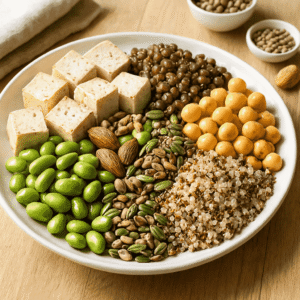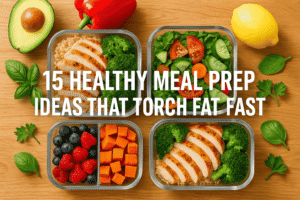Vitamins are the foundation of good health. They fuel your body, boost your immunity, and keep your organs functioning optimally. Without them, you may experience fatigue, weakened immunity, and other health issues. Let’s dive deep into the world of vitamins and learn how they help you stay strong and energized!
What Are Vitamins?
Vitamins are organic compounds your body needs in small amounts to function correctly. They play a vital role in energy production, immune support, and cell regeneration. Unlike macronutrients like proteins and carbohydrates, vitamins do not provide energy but are essential for various bodily functions.
There are 13 essential vitamins, categorized into two groups:
- Water-Soluble Vitamins (e.g., Vitamin C and B-complex) – Not stored in the body and need to be consumed daily.
- Fat-Soluble Vitamins (e.g., Vitamins A, D, E, and K) – Stored in body fat and used when needed.
Types of Vitamins and Their Functions
Water-Soluble Vitamins
✅ Vitamin C (Ascorbic Acid)
- Strengthens immunity
- Promotes healthy skin and wound healing
- Found in citrus fruits, strawberries, and bell peppers
✅ B Vitamins (B1, B2, B3, B5, B6, B7, B9, B12)
- Improve energy production and brain function
- Prevent anemia and support metabolism
- Found in whole grains, eggs, dairy, and leafy greens
Fat-Soluble Vitamins
✅ Vitamin A
- Essential for vision and skin health
- Found in carrots, sweet potatoes, and fish
✅ Vitamin D
- Promotes bone strength and calcium absorption
- Found in sunlight, dairy, and fatty fish
✅ Vitamin E
- Powerful antioxidant that protects cells
- Found in nuts, seeds, and spinach
✅ Vitamin K
- Helps blood clotting and bone metabolism
- Found in leafy greens and fermented foods
Importance of Vitamins for a Healthy Life
Vitamins are crucial for:
✔ Strong immunity
✔ Healthy skin, hair, and nails
✔ Better digestion and energy levels
✔ Preventing chronic diseases
A vitamin deficiency can lead to fatigue, weakened immunity, poor skin health, and even serious illnesses like osteoporosis or anemia.
Best Food Sources of Essential Vitamins
Natural Sources
- Fruits: Oranges, bananas, berries
- Vegetables: Spinach, carrots, bell peppers
- Dairy: Milk, cheese, yogurt
- Proteins: Fish, eggs, nuts, seeds
Fortified Foods and Supplements
Sometimes, getting all vitamins from food alone is tough. Fortified cereals, milk, and supplements help fill the gap. However, whole foods should be your primary source!
Symptoms of Vitamin Deficiency
- Vitamin D Deficiency – Weak bones, fatigue
- Vitamin C Deficiency – Weak immunity, bleeding gums
- Vitamin B12 Deficiency – Nerve damage, anemia
How to Maintain Optimal Vitamin Levels
✔ Eat a variety of whole foods
✔ Spend time in sunlight for Vitamin D
✔ Take supplements only when necessary
✔ Stay hydrated for better absorption
Can You Take Too Many Vitamins?
Yes! Overconsumption can lead to vitamin toxicity. For example:
⚠ Too much Vitamin A can cause liver damage
⚠ Excess Vitamin D can lead to kidney stones
⚠ High doses of Vitamin C can cause stomach issues
Always follow recommended daily intake guidelines.
Choosing the Right Vitamin Supplements
Not all supplements are created equal! Consider:
✔ Quality and brand reputation
✔ Third-party testing
✔ Your specific health needs
The Role of Vitamins in Disease Prevention
Vitamins help prevent:
✅ Heart disease (Vitamin E, B-complex)
✅ Osteoporosis (Vitamin D, K)
✅ Vision loss (Vitamin A, C)
Eating a balanced diet rich in essential vitamins can boost longevity and reduce disease risks.
FAQs About Vitamins
1. What is the best way to get enough vitamins?
A well-balanced diet with plenty of fruits, vegetables, and proteins is the best way.
2. Can I get all my vitamins from food alone?
Most people can, but some may need supplements (e.g., vegans, pregnant women, older adults).
3. What happens if I take too many vitamins?
Overconsumption can cause toxicity, leading to liver, kidney, or nerve damage.
4. Do multivitamins really work?
They help fill nutritional gaps but shouldn’t replace whole foods.
5. Which vitamins are most important for overall health?
All are essential, but Vitamin C, D, B-complex, and A are crucial for immunity, energy, and well-being.




